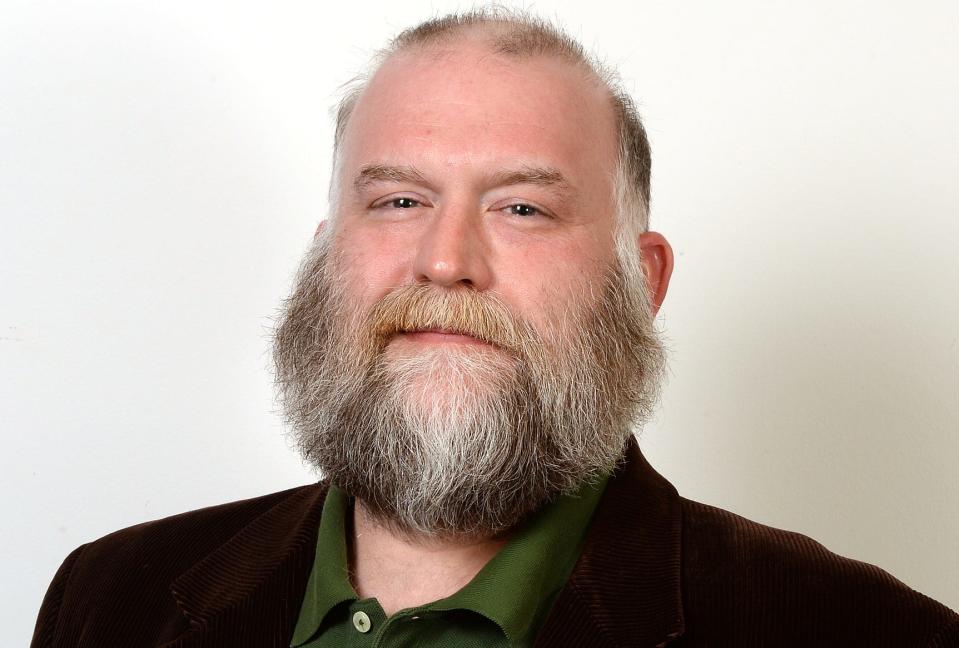David Murdock Column: On that man behind the curtain
Never, ever, pay attention to that man behind the curtain … if peace of mind is your goal. In the classic movie, “The Wizard of Oz,” Dorothy and her friends are awed by the “great and powerful Oz” when her “little dog” Toto pulls aside a curtain to reveal a man there, furiously working the levers of a machine, who intones into a microphone, “Pay no attention to that man behind the curtain!”
If you have seen the movie, you know the kicker — the man behind the curtain is the “great and powerful Oz.” The Wizard turns out to be nothing more than a trick of technology. That image came to me this morning while pondering something I saw when I woke up.

Rolling out of bed, I glanced down at a trash can, one with a shiny black exterior. A man was reflected there — an old man with a perfectly kept beard wearing an old-fashioned suit. I started trying to figure out what the trash can was reflecting. Last night, I’d tossed two balled-up pages of paper at the trash can, missed, and was too lazy to find them and toss them in. The reflection was those two sheets of paper. My mind made “sense” out of an unfamiliar pattern.
That psychological process is called “pareidolia” — that’s when our brains interpret random images to “mean” something that makes “sense.” The classic example is seeing, say, a bunny rabbit or a duck in a cloud. Another common instance is seeing an image in wood grain. There was a pattern in the wood paneling of my parents’ house that always looked like a fox to me, for example.
Usually, it’s been my experience when I experience pareidolia that I “see” something that was on my mind recently. The fox in the wood grain? I can’t remember why I saw a fox when I was a child. It amuses me that the first two examples of a shape in summer clouds that I came up with were a bunny rabbit … and a duck. Yes, I watched a lot of Bugs Bunny and Daffy Duck cartoons.
Anyway, I think the old man reflected in the trash can was William James, the American philosopher and psychologist who died in 1910. Not exactly a household name now, but he has been of special interest to me since I was in college. I have several books about him and a large portion of his own writings. He was on my mind last night because I ran across an unfamiliar quote by him in a book I’m reading.
I won’t repeat the quote. Why? He likely never said it.
After running across it, I noted the quote so I could track it down later. I own a large portion of his writings; I haven’t read all of them. I’ve certainly never studied him in detail, but I’ve read enough of his writing to have a “feel” for how he sounds, and the quote didn’t sound like him. So, I was suspicious.
This morning, I tracked it down. According to the website, Quote Investigator — which is an invaluable resource — the quote does appear during James’s lifetime, but it is not attributed to him then. William James is not attributed as the source until 1943.
Is William James the “man behind the curtain”? No. The writer of the book I was reading is. There were two more quotes from the book from famous thinkers — one attributed to Jonas Salk, the other to Michelangelo. After looking into each quote, both appear to be “debatable,” at best. There is no firm evidence either was given by Salk or Michelangelo.
Now, I’m going to give the writer a break and not mention his name. At the time that he wrote the book, all three quotes were widely disseminated on the internet and credited to the persons to whom he credits them. So, I think he gave the quotes in good faith, confident that the sourcing was correct.
Now — back to that “man behind the curtain.” In the movie, does “the great and powerful Oz” solve the problems of Dorothy and Gang? Well, yeah. Sorta. Just not in the way that they thought he would.
The internet is our Oz. We think of it as being “great and powerful.” It is, just not in the magical way we think. As astute readers have already noticed, I used the internet to do the research disproving the internet. If a website does not give me a specific citation of where the quote comes from, I’ll keep searching. The reason I trust the Quote Investigator website is that they do give specific citations that I can check for myself.
Because I do! Two people in my early life made me skeptical — my mother and my preacher. Mom filled me with all sorts of homey sayings that led me to be skeptical, and my first preacher once held up his Bible during a sermon and said, “You don’t believe me? It’s written right here!” I’ve been reading it since.
That’s why I generally don’t believe everything I’m told, as Mom urged, and it’s why I check citations. I’ve paid attention to the man behind the curtain for a long time now.
David Murdock is an English instructor at Gadsden State Community College. He can be contacted at murdockcolumn@yahoo.com. The opinions reflected are his own.
This article originally appeared on The Gadsden Times: David Murdock looks at the man behind the curtain

